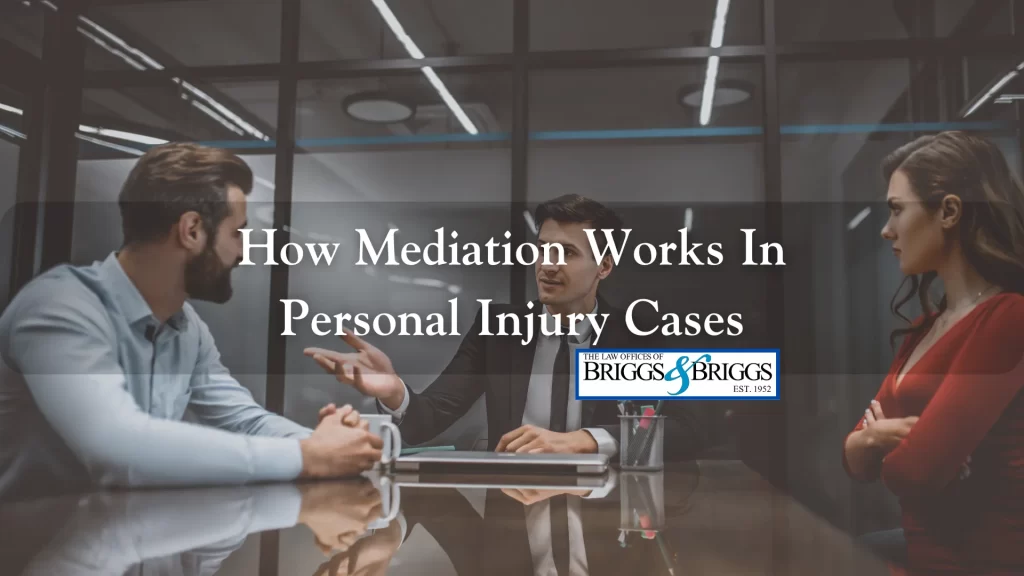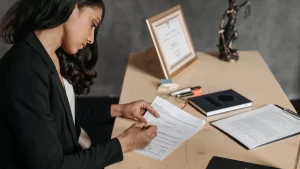Posted on Friday, September 1st, 2023 at 9:00 am

How does mediation work in personal injury cases in Washington? Most people don’t realize that there is more than one way to settle a personal injury claim. You can file an insurance claim, take a case to court, or opt for a third option: mediation. Mediation is an alternate way to resolve a personal injury case and pursue the compensation you deserve that can help you avoid the stress of taking a case to trial.
At The Law Offices of Briggs & Briggs, we want to help you understand how personal injury mediation works, what to expect in mediation, and the potential benefits of choosing this path to resolve your claim.
Why Consider Mediation After an Injury?
Mediation is an alternative way to resolve a dispute between two parties. In mediation, each side agrees to present their evidence and allow a neutral third party to help them resolve their dispute without taking a case to trial. The mediator helps facilitate communication between the parties to reach a mutually beneficial resolution.
Why should you consider mediation in a personal injury case? Mediation is often a much quicker and less confrontational process than taking a personal injury case to trial. Preparing a case for court takes time-consuming preparation, not to mention the time it takes to wait for a date to open on the court’s calendar. Mediation is also less formal than a trial, meaning you may experience less stress and anxiety moving through the process.
Mediation may also offer you more potential for more flexible solutions to your case. Both sides are strongly encouraged by the mediator to work together to develop an agreement that addresses the goals and concerns of each party involved.
The Role of Your Personal Injury Lawyer in Mediation
Although less emotionally taxing than preparing for a trial, mediation can still be intimidating without proper preparation. Having a personal injury attorney in your corner ensures that your best interests remain front and center and that you have someone with experience who can prepare you for what’s ahead. An attorney can gather and preserve evidence to present in mediation and help you understand what mediation entails from start to finish.
Mediation is less formal than a trial. However, you still want an attorney representing your interests during mediation discussions. An attorney can help keep you on track and present your side of the case in the most compelling way possible. Solid legal representation can increase your chances of avoiding the mediation process with fair compensation.
A personal injury attorney’s role is to help you maximize your compensation by advising you during the settlement negotiations. Even in mediation, negotiating with another party, especially a large insurance company, can be intimidating. An attorney can review new offers and make counterdemands for the money you need.
What to Expect During the Mediation Process
 Most people don’t know what to expect in mediation. First, a neutral, third-party mediator facilitates communication between the parties and helps them reach a mutually binding agreement. Before the mediation process begins, both sides are typically asked to sign confidentiality agreements. One of the benefits of mediation is that the proceedings and resolution are private. Court proceedings are a matter of public record. Mediation typically is not.
Most people don’t know what to expect in mediation. First, a neutral, third-party mediator facilitates communication between the parties and helps them reach a mutually binding agreement. Before the mediation process begins, both sides are typically asked to sign confidentiality agreements. One of the benefits of mediation is that the proceedings and resolution are private. Court proceedings are a matter of public record. Mediation typically is not.
Both sides can present their case during mediation, much like in a personal injury trial. A mediator allows each side to communicate their goals and concerns and then helps facilitate meaningful discussion between both parties. A mediator encourages both sides to move closer to a compromise to reach a fair settlement and keeps each party engaged.
Depending on the situation, a mediator may focus on joint or private discussions between the parties. In private discussions, the mediator separates each party and discusses their claims privately. The mediators then communicate each side’s concerns to the other, going back and forth and moving both parties toward a resolution.
The goal of mediation is to reach a fair settlement. Settling means both parties sign a written agreement outlining the settlement terms. This agreement usually contains a release saying that the injured party cannot return to the at-fault party for more money later. A signed mediation agreement is legally binding.
Key Takeaways for Injured Individuals
One of the key takeaways for injured individuals is that mediation can be a beneficial way of resolving a dispute, allowing you to avoid the stress of a trial. It also means you may get compensation much more quickly than if you were to wait for a trial to play out, putting your fate in the hands of a judge or jury. Another advantage of mediation over trial is that you have some say in the outcome. If a case goes to trial, the judge or jury are the only people with a say in the decision.
You can enter mediation without the assistance of an attorney. However, working with an experienced personal injury lawyer means you have the support and guidance to navigate the process smoothly. An attorney can advocate for you and facilitate a fair settlement when negotiations get tough. Your attorney can also ensure that during the process, you are being heard and have the chance to present your case to the mediator.
Mediation should aim to reach a fair resolution for all parties. You deserve compensation for your injuries and financial losses. An attorney can help calculate your accident-related losses and negotiate for the money you need.
Contact an Experienced Personal Injury Lawyer for More Information on Mediation
Are you interested in learning more about mediation and why it might be the right choice for your personal injury claim? Discuss your situation with a skilled Washington personal injury lawyer from The Law Offices of Briggs & Briggs. Our legal team can review the facts in your case and give you straightforward advice about your legal options moving forward.
Call our Washington office today at (253) 588-6696 to arrange a consultation and learn more about your legal rights.
Related posts
What Documents Do I Need for My Personal Injury Case?
Calculating Your Lost Wages in a Personal Injury Case
How Are Personal Injury Settlements Are Paid Out
